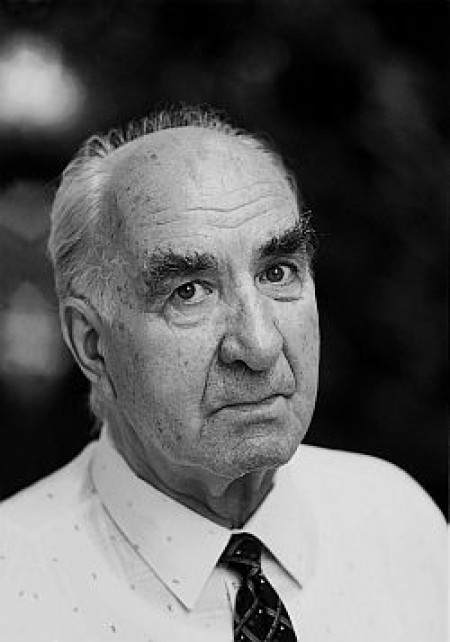
2 July 1923, Szarvas – 27 November 2009, Budapest
"Let the names of all my teachers be blessed, but first and foremost the name of Anna Rosthy, primarily because at first she allowed me to sing only songs. It was Imre Molnár's obsession that singing is not the same as shouting and roaring; singing is conveying thoughts and sentiments; it is not a stunt, but a particular, artistic means of communications.
"At the Berlin Komische Oper, with Felstein, we repeated a scene that by then everyone knew a hundred times. Improvisation is alien to this art form, one can only create the impression of improvising – once one has complete command of the role."
György Melis studied at the Music Academy between 1945 and 1950, as the pupil of Anna Rosthy, Imre Molnár, and then Mrs Ferenc Révhegyi. He had his Opera debut in 1949, as Morales in Carmen. A few years later he was already the first baritone of the Opera, the successor to Imre Palló both as regards his repertoire and his popularity. His voice was a lyric baritone's, but his personality enabled him to sing heroic baritone parts as well. It is perhaps precisely his multifaceted personality that explains the fact that his greatest roles belonged to the heroic baritone repertoire: Don Giovanni, The Force of Destiny – Carlos, Figaro – the Count. "We were afraid of him when he demanded the key from his wife, or when his passion flared up in the D major aria; we believe his desire in the A minor duet, and are grateful to him for his ability to fit into the buffo situations, ensembles, in which generally he is the looser at the end, without condescending or loosing his dignity" – said György Kroó in connection with the January 1977 performance of The Marriage of Figaro, put on as part of the series of performances celebrating János Ferencsik's birthday.
He first sang Don Giovanni in 1955, and from that time onward he was in the first rank as regards the Mozart and the light Italian roles. As always, he could say something new every time in these roles as well. Miklós Erdélyi experienced working with him as an almost inexhaustible source of pleasure: "We are now preparing a Don Juan revival. A revival – with Melis. The word gains its original meaning. Because he never repeats his old performances, he does not bring ossified forms and mannerisms. He revives Don Juan inside himself, for himself."
His was a complex art: the voice capable of achieving almost every shade played just as important a role in it as did a higher order of musicality, stylistic sureness, technical knowledge and a many-faceted personality. All these together gave him his ability to create an atmosphere. He sang the leading baritone roles of every Mozart work performed in Hungary, the Verdi heroes, and almost every work in the repertoire, with the exception of Wagner.
In 1963 he was a participant in one of the great Ferencsik productions, the premier of Debussy's Pelleas and Mélisande, which allowed the Budapest audience not only to become acquainted with the work itself, but also to appreciate the enchantment in which Bartók composed the ballad for bass strings at the beginning of Bluebeard's Castle. Mentioning the parallel is no accident: Bluebeard was one of the most important roles in Melis's carer. He first sang it under Ferencsik's baton, struggling with the memory of past giants – Oszkár Kálmán and Mihály Székely. With Melis, once again a baritone "took back" the role from the bases, as it accords with the score. He won one of his greatest successes at home and internationally with the role of Bluebeard.
His Hungarian repertoire was unique: in Bánk Bán he sang Biberach, Tiborc and Petur, in János Vitéz (John the Valiant), Johnny Corn, the Sergeant and Bagó.
He was regarded as the great actor of his age, who was also an outstanding singer. His Onegin was legendary. In that part he had to solve the most difficult task: to convey indifference, greyness, and yet gain the attention of the audience. And while doing that, he sang and delivered the text beautifully, and at the end of the opera caught fire with elemental strength.
Those were much-awaited operatic moments when he sang Figaro in Rossini's The Barber of Seville. He proved himself to be a grand comedian, who to the acclaim of the audience improvised a wealth of lazzo-ideas, with the sureness of knowledge and lots of practice.
Melis was also a fine singer of songs, as well as a soloist of oratoria. The premier of many new Hungarian works is linked to his name. He gave many guest performances abroad.
He was awarded the Kossuth Prize, and on three occasions the Liszt Prize, and also the title, Outstanding Artist.
A.T.


